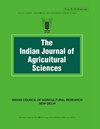核细胞质互作对印度芥菜(Brassica juncea)杂种柱头接受性的影响
IF 0.7
4区 农林科学
Q4 AGRICULTURE, MULTIDISCIPLINARY
引用次数: 0
摘要
以印度芥菜(Brassica juncea (L.)) Moricandia、erucoides和berthautii 3个新的细胞质雄性不育(CMS)源为材料,于2020 - 2021年和2021 - 2022年在新德里icar -印度农业研究所(ICAR-Indian Agricultural research Institute)的研究农场,研究了30个CMS新品系对柱头受性的响应。Czern。]利用两种性状,即单穗结实率和单穗结实率,这两种性状在制种过程中对杂交种子产量很重要。CMS系对不同遗传背景表现出不同的响应。由于细胞质-核相互作用,每个硅片的百分数和种子数发生了变化。花后7天人工授粉的柱头可接受性评价研究表明,3种CMS来源的芥菜柱头可接受性存在差异。花期后2 ~ 3天柱头可达到顶峰。在3种CMS源中,柏氏花的柱头接受性高于莫里坎花和山核桃花。在核基因型中,Pusa Tarak是最有希望的。新的CMS源具有较高的柱头接受性,可用于杂交育种。这些发现将有助于选择合适的核细胞质组合用于芥菜杂交育种计划。本文章由计算机程序翻译,如有差异,请以英文原文为准。
Nuclear-cytoplasmic interaction for stigma receptivity in Indian mustard (Brassica juncea) hybrid development
Field experiments were conducted during 2020–21 and 2021–22 at the research farm of ICAR-Indian Agricultural Research Institute, New Delhi to study the response of stigma receptivity in 30 new CMS lines, based on 3 new cytoplasmic male sterile (CMS) sources namely, Moricandia, erucoides and berthautii of Indian mustard [Brassica juncea (L.) Czern.] using two traits, i.e. per cent siliquae set and seed set per siliquae which are important for hybrid seed yield in seed production. CMS lines showed varying responses to distinct genetic backgrounds. Per cent siliquae set and seed set per siliquae changed due to cytoplasmic-nuclear interaction. Studies on stigma receptivity evaluation using manual pollination up to 7 days since anthesis revealed that it varies among the 3 CMS sources of Brassica juncea. Peak stigma receptivity reached up to 2 to 3 days following flower opening. Among the 3 CMS sources berthautii showed higher stigma receptivity compared to Moricandia and erucoides. Among the nuclear genotypes, Pusa Tarak was the most promising. The new CMS sources would be useful for hybrid development based on higher stigma receptivity for hybrid seed production. These findings will aid in the selection of appropriate nucleo-cytoplasmic combinations for use in the B. juncea hybrid breeding programmes.
求助全文
通过发布文献求助,成功后即可免费获取论文全文。
去求助
来源期刊

Indian Journal of Agricultural Sciences
农林科学-农业综合
CiteScore
0.80
自引率
25.00%
发文量
273
审稿时长
6 months
期刊介绍:
The Indian Journal of Agricultural Sciences publishes papers concerned with the advancement of agriculture throughout the world. It publishes original scientific work related to strategic and applied studies in all aspects of agricultural science and exploited species, as well as reviews of scientific topics of current agricultural relevance.
Specific topics of interest include (but are not confined to): genetic resources, all aspects of crop improvement,crop production,crop protection, physiology, modeling of crop systems, the scientific underpinning of agronomy, engineering solutions, decision support systems, land use, environmental impacts of agriculture and forestry, impacts of climate change, rural biodiversity, experimental design and statistical analysis, the application of new analytical and study methods (including molecular studies) and agricultural economics. The journal also publishes book reviews.
Articles are accepted on the following broad disciplines:
Agric. Engineering & Technology, Agric. Social & Economic Sci., Agronomy, Biometry, Biosciences, Cytology, Ecology, Environmental Sciences, Fertilization, Forestry , Genetics, Horticultural Sciences, Microbiology, Pest, Weed Control etc., Molecular Biology, Plant Pathology, Plant Breeding, Physiology and Biochemistry, Soil Sciences, Special Cultivation Technology, Stress Breeding, Agric. extension, and Cell Biology.
 求助内容:
求助内容: 应助结果提醒方式:
应助结果提醒方式:


